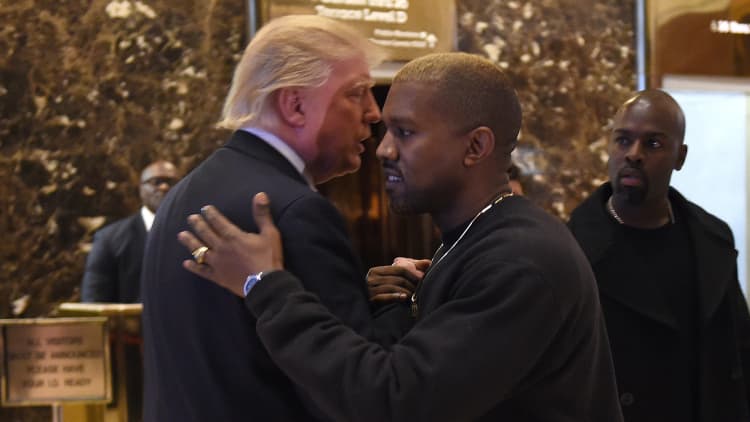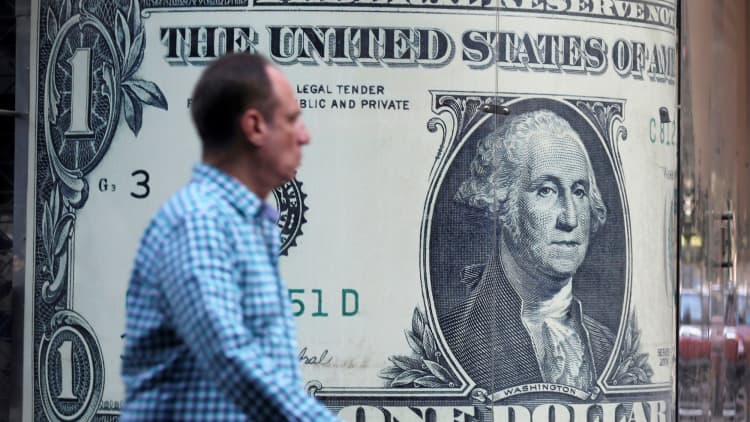
Wall Street has high expectations for Donald Trump's inauguration speech, but it's more likely the president-elect glosses over details, while sending a strong message for change.
Stocks rose on the opening Friday, ahead of Trump's swearing in and speech, at midday. It was a far different market than Thursday, when anxiety about what Trump might accomplish helped lead to a sell-off.
"There's a lot of people that got wound up on the 'buy the election, sell the inauguration trade.' This might be the unwind of that. It doesn't feel like the right trade for today," said Art Hogan of Wunderlich Securities. "At some point the market will wake up to the reality that this is Washington. ... At some point, you have to juxtapose what's been promised, which is a lot ... with what can get done."
The real action from the new president may not come in the highly anticipated speech but in the hours and days after the inauguration. Trump is expected to immediately issue executive orders on matters like trade, immigration and energy, analysts said. But traders will be looking for pointed remarks and details in his first address as president that show that the administration will move quickly to make sure there will be changes to corporate and individual tax law, less regulation and federal infrastructure spending.
"It's become a binary event for the market," said Scott Redler, partner at T3Live.com. "I think the consensus is saying 'sell the inauguration.' Meanwhile, nobody wanted to buy the election until the rally already started." Redler said the line in the sand for traders coming in Friday morning was 2,254 to 2,257 on the , after it closed lower at 2,263 on Thursday.
"Everyone who was saying 'sell the rally,' may have sold yesterday," said Redler. "It seemed a lot of people were hedging into today because they were afraid we'd see selling into the event." He said there is the potential for a big short squeeze, which could send the market much higher if Wall Street hears what it's looking for in Trump's speech.
The inauguration address has been looked at as an opportunity for Trump to prioritize goals. Stocks reacted negatively to his news briefing last week because he never discussed taxes and stimulus but highlighted his view on tariffs, which make markets nervous.
Stocks bounded to all-time highs after Trump was elected, trading on hope that his policies would promote growth and affect long-term positive changes for the U.S. economy. But the market has been relatively range bound in recent weeks, as traders look for more details around the policies, particularly tax reform. On Thursday, the Dow fell 72 to 19,732, down for a fifth day in its worst losing streak since just before the election in early November.
"It's going to be about growth and opportunity," said Dan Clifton, head of policy research at Strategas. Clifton said Trump may have a trick up his sleeve, and the inauguration speech could contain a wild card. One long shot could be a firm commitment on fiscal spending, even though a fiscal plan is not expected until later in the year, he said.
"He's looking for ways to bind the country together, and that's very hard to do," said Clifton. Trump will likely take aim at terrorism, ISIS and China, and is expected to contain promises to put America first, he said.
"My expectation is that it will be one of the briefer inaugural speeches. I would not be surprised if he couches it in terms of … what the 45th president thinks he might mean to this town and policymaking, and therefore to the country, as he attempts to reset relations on a global basis, and to reorient policymaking in Washington in the way it affects the economy and individual sectors and companies," said Kim Wallace, head of Washington Policy Research at Renaissance Macro Research.
But there won't be much in the way of specifics. "You never get a lot out of inaugural speeches … in terms of digestible, tradable, investable ideas, it's highly unlikely," said Wallace.
That could be disappointing to the markets unless traders view the speech the way they did Trump's first comments after winning the election. He made broad comments in the early morning of Nov. 9, promoting his growth policies, and change for America, without focusing on things like tariffs. Traders point to that as the turning point and trigger for the Trump rally.
Inauguration Day has mostly not been a positive for stocks, according to analytics firm Kensho. On that day for the past five new presidents, the S&P 500 was down 80 percent of the time for an average decline of 1.6 percent.
"There's sort of an inertia [in the market] that we expect is going to resolve itself sometime between inauguration tomorrow and the Fed meeting on Feb. 1. We continue to think a lot of the good news is priced in to the market, and we continue to see scope for a pull back here. It's a ceremonial event," said Julian Emanuel, equity and derivatives strategist at UBS. "To the extent that the speech says something that will move the market, it will move the market."
But Emanuel said Trump will have to show he is moving fast on his agenda. "If you own financials, you're not likely to want to sell them but you're not likely to want to buy them either because they've run up so much," he said. Financial stocks Friday were about a half percent higher in morning trade.
"Anything he may say that's market-moving may be subsumed by pomp and circumstance. The market is expecting a lot done very quickly, and we think it's expecting too much very quickly. The market will not be patient for inaction over the first several weeks. They need to see progress on … all of the things he's laid out. They don't necessarily need to see clarity because on the bigger issues, like taxes, it's going to take several months to see clarity," he said. As stocks rallied, bonds sold off, with the Friday testing the key 2.50 percent level.
Trump could get to work quickly, and there are some actions he can take once he enters the White House on Friday afternoon. "[Friday's] going to be trade day, NAFTA, TPP withdraw and some stronger enforcement of trade deals," said Clifton.
Clifton said the first actions will likely be ones that are aimed to please Trump's base and the workers that supported him. He said Canada and Mexico are ready to renegotiate the North American Free Trade Agreement, which he says is viewed as outdated. The Trans-Pacific Partnership will also be officially shelved by Trump, as expected. Trump could also move on tightening up immigration.
In week one, the new president may also take action on energy projects that were put aside by the Obama administration, including the Keystone pipeline and even the controversial, Dakota Access pipeline, according to Clifton. He could also allow permits for more drilling on federal land.
But Clifton expects tariffs to come later. He pointed out that Trump dropped his goal of labeling China a currency manipulator on day one, and instead said in an interview he would talk to Chinese officials first. He may take the same approach with Mexico before slapping tariffs on imports from that country, but the tariffs could still come, Clifton said.
But Wallace says while the noise around trade could continue, ultimately big shifts in policy are likely to be rejected because they would harm the economy.
"Beginning January 23, the U.S. is not going to engage in wrecking the global trade order. It's not in our interests and it would hurt us as much as anyone else," said Wallace. "The first people who are hurt are the people who shop at big box retailers."
Individual investors also have an agenda of what they hear from Trump, according to findings of a UBS Wealth Management survey.
The majority, 55 percent, of the 2,000 high-net-worth investors in the survey wanted to see Trump focus on infrastructure in the first 100 days. Fifty-four percent also put health care at the top of the agenda, and 38 percent said lowering taxes should be a high priority.
UBS Wealth Management has run the survey several times, including before the election.
"The punch line coming out of all this is whether you are looking at the individual investor or the business owner … both on the individual side and the business owner side, people are looking to invest more. People are looking for growth. People think the next administration is going to help facilitate that growth," said Sameer Aurora, Head of Client Strategy, UBS Wealth Management Americas.

Disclosure: CNBC parent NBC Universal is a minority investor in Kensho


